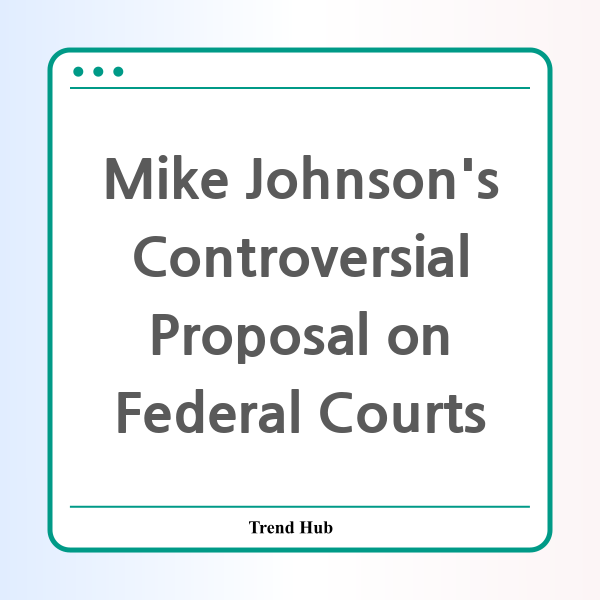* This website participates in the Amazon Affiliate Program and earns from qualifying purchases.

In a bold move that has created waves across the political landscape, Speaker Mike Johnson of Louisiana has sparked a heated debate by suggesting Congress could eliminate some federal courts. This proposal comes in response to increasing frustration from the right regarding judicial rulings that have clashed with policies of the Trump administration.
Johnson’s statement reflects a growing sentiment among certain Republican factions who feel that judges have overstepped their bounds, particularly after several courts have blocked decisions made by former President Trump. This rhetoric aligns with broader calls from Trump and his supporters to consider drastic actions against judges perceived as a threat to the agenda.
During a recent press conference, Johnson stated, "We do have the authority over the federal courts, as you know. We can eliminate an entire district court. We have power of funding over the courts and all these other things." He emphasized that congress has the constitutional authority to oversee the structure and funding of federal courts, suggesting that desperate times might call for desperate measures.
Historically, Congress has abolished courts before. Notable examples include the dissolution of the Commerce Court in 1913 and the implementation of the Court of Claims and the Federal Circuit Court in the 1980s. These historical precedents provide a context for Johnson's remarks, though whether similar actions can be successfully pursued today remains uncertain.
House Judiciary Chairman Jim Jordan echoed Johnson's sentiments, indicating that discussions around legislative remedies targeting specific judges are forthcoming. However, the practicalities of executing such proposals would require navigating complex appropriations processes and gaining support from both moderate Republicans and Democrats. This path to reform is fraught with potential obstacles, not the least of which is the need for bipartisan cooperation in a polarized political environment.
Indeed, even within the Republican party, there are varying opinions on Johnson's drastic proposal. Some members, like Senator Josh Hawley, have expressed concern that eliminating district courts could lead to significant backlogs in the judicial system, highlighting the unintended consequences of such a move. There is a faction that believes strengthening the bench with more conservative judges would be a more effective strategy than attempting to eliminate existing courts.
As the deadline for government funding looms, the implications of these discussions will become more pressing. House Republicans are expected to grapple with their narrow majority and internal divisions as they push forward with proposed legislation that may limit the power of district court judges. Upcoming votes, including one to prevent district court judges from issuing nationwide injunctions, will be critical in gauging the party's direction and Johnson’s influence moving forward.
In summary, Speaker Mike Johnson’s bold proposal to eliminate some federal courts has ignited a significant debate within the Republican party and beyond. With the complex layers of appropriations and the necessity for bipartisan agreement on any legislative change, it remains to be seen whether this proposal will gain traction or become another contentious talking point in the ongoing battle over judicial authority.
* This website participates in the Amazon Affiliate Program and earns from qualifying purchases.